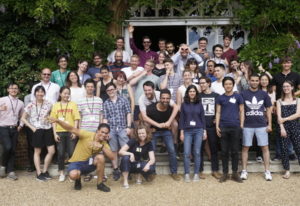Introduction
Hermes 2018 Summer school began with an inspiring introductory lecture from keynote speaker Prof. Adrian Sutton, sharing with us his exciting story of his academic work and personal journey in condensed matter physics and materials science. Prof. Sutton is a fellow of the Royal Society and one of the founders of the Thomas Young Centre for the theory and simulation of materials in London.
Prof. Sutton’s talk discussed the importance of recent developments in materials science and the potential impact of future technological materials on human life. For example, he discussed polymer/plastic technologies, how important plastics have become in our everyday lives, as well as the impact of these technologies on the environment and how we can make a difference as theoretical/computational scientists.
Following the keynote lecture, informal discussions continued over dinner in the beautiful dining halls of the Cumberland Lodge. The evening ended with an informal ice-breaking social mingle, allowing the participants to relax, explore the great Windsor Park and the lodge itself while getting to know each other.
A demanding several days awaited: a series of graduate lectures focusing on the main branches of computational materials science, a series of workshops on those topics (molecular dynamics, density functional theory and finite element modeling), and a seriesof lectures and workshops on science communication, to be put to use in the poster session and presentation competition.
Graduate Lectures and Workshops
The graduate lectures and practical sessions took place each morning of the school, followed by science communication activities in the afternoons and evenings.
On Friday 20th, Prof. Maria Ramos started the day with a lecture on materials modelling and how she uses it in her research, such as for modelling mechanisms of enzymatic reactions and drug discovery. She discussed systems where several length scales are important, and multiscale methods such as quantum mechanics/molecular modelling (QM/MM) are required to carry out computational simulations. Following her talk, Dr. Glen Jones of Johnson Matthey gave a similar talk on how he computational simulations in his industrial research. The two talks were followed by discussions on academia vs industry in small groups and then a panel discussion with the two speakers and other invited speakers.
In the afternoon, Dr. Julian Schneider gave an introductory lecture on materials modelling using molecular dynamics. This was followed by a practical session using the QuantumATK GUI. QuantumATK is a very user friendly program for performing molecular dynamics and
density functional theory simulations. It was a great way to get started with moleculardynamics for those unfamiliar with the subject.
On Saturday 21st, Prof. Matt Probert and Dr. Phil Hasnip gave lectures and ran practical sessions on density functional theory (DFT). The lectures covered the history and the basic theory of DFT for those who have never used it. They went on to discuss some ongoing research projects of which DFT is a crucial part. In the practical sessions, students learned how to get up and running with DFT calculations using the CASTEP software. On Sunday 22nd, Prof. Daniele Dini gave a masterclass on the finite element modelling. He started with some introductory lectures on the basic theory and then ran a practrical session where students wrote finite element modelling codes to solve problems in materials science.
Science Communication
The academic activities of Hermes 2018 were supplemented by a program of science communication workshops. Organisers of previous iterations of Hermes returned to give talks on their experiences after their PhDs. Profs. Craig Carter and Dan Lewis gave talks on how to prepare presentations and communicate effectively during them. On Saturday evening, students were split into groups for a problem solving session. The aim was for each group to collectively come up with a solution to a difficult problem (from a list of problems provided by Prof. Carter), and then present the solution together. The goal of the exercise was not to solve academic problems, but for the students to practise their communication skills while working together to solve the problem, and their presentation skills while presenting their solutions to the rest of the participants.
The series of communication workshops concluded with an inspiring motivational seminar by Piero Vitelli (Island 41), a freelance professional transferable skills trainer. He taught about the art of an engaging presentation, focusing on the very human emotional and psychological aspects that go into making a presentation unforgettable.Students had a chance to practise everything they learned about science communication during the poster session and presentation competition, for which prizes were awarded for the best posters and presentations. This was also a great chance for the students to network and learn about one another’s research, and potentially initiate collaborations.
Conclusion
Hermes is a student run Summer school which, for almost 10 years, has carried out the following main aims and ethos:
- Training participants in the theory and simulation of materials beyond the remit of their own PhD field and discipline.
- Training in communication – an ability to cast technical scientific content into clear and accessible form, using modern media devices and to engage and educate the audience.
- Using innovative learning and teaching strategies to ensure a high quality programme with effective knowledge exchange.
- Developing a lasting international network of PhD students and academics.
Hermes 2018 was a huge success and was no exception in this regard.
Event Website: http://hermessummerschool.org/previous-hermes/

